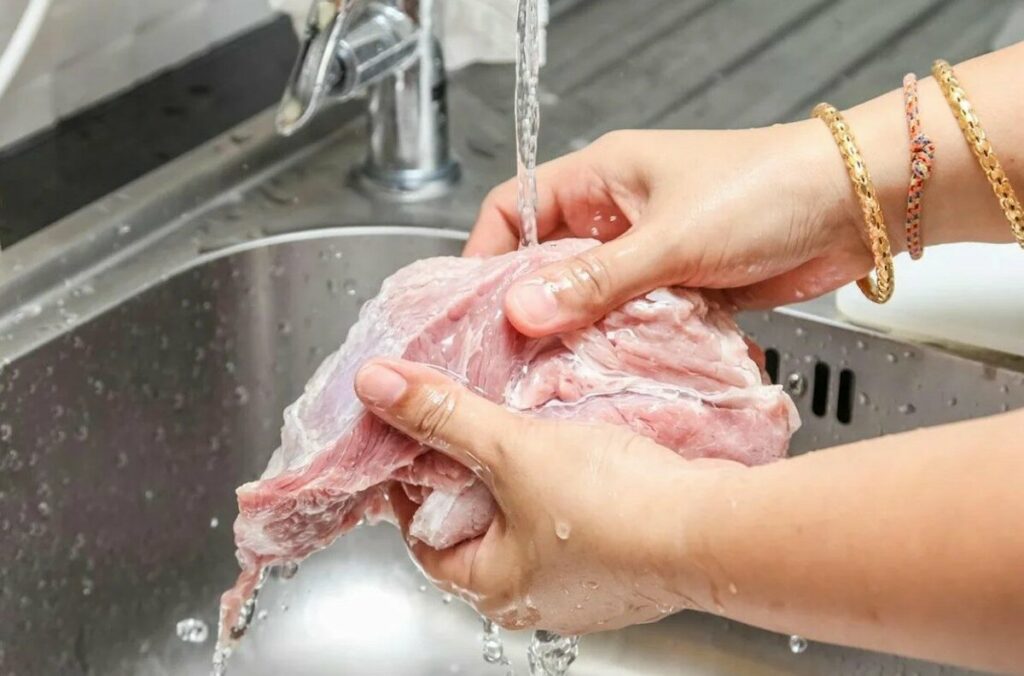
Water is the answer to all of our health problems; we wash our bodies to purify ourselves, as well as our belongings, food, and clothes. Health is crucial, and while water generally seems to cleanse the body, there are a few instances where it doesn’t, some of which are discussed below.
Before cooking, we frequently wash everything, but this practice occasionally causes more harm than good. Naturally, cleaning produce is a good habit, but some foods, even those purchased from a grocery shop, should never be cleaned for a variety of reasons.
Never Wash These 7 Foods Before Cooking Them
Have you ever heard that it’s preferable to avoid washing some foods? Here are the seven foods that you should never wash!
1. Eggs
Since eggs come from someplace you don’t want to think about it, you might have thought about cleaning your eggs before separating them for that omelet.
However, if you reside in the United States, there is no need for concern. All commercially sold eggs in the US have previously been washed with soap and hot water due to the relatively stringent standards there. The natural “bloom” or protective coating on the outside of the egg is removed as a result, but it is replaced with a thin layer of mineral oil.
Companies that produce eggs use chemicals to the surface that aid lower bacterial growth and multiplication. You don’t really believe washing it is a good idea, do you? This chemical offers defense against infections and germs.
Naturally, you should always be sure to properly cook your egg to avoid contracting food poisoning from salmonella or other bacteria found inside the shell.
2. Chicken
Now, isn’t this a required practice? Even if you don’t know the specifics, you are aware that you don’t want salmonella in your system because we have all heard the narrative. So you’d better not wash that breast piece you have in your fridge if you want to avoid avian infections.
It is better not to wash the breast piece, but let’s boil it twice just to be safe. Boiling and temperature are the only surefire ways to kill bacteria, and washing simply serves to spread the bacteria to your hands, the kitchen sink, and wherever else you use those wet hands in the kitchen.
3. Red meat
Similar to how we carefully wash chicken before putting it in the curry, we do the same with meat. In either case, the situation is the same.
In actuality, it is preferable to drain the meat’s juices using a couple towels before boiling or frying it. Almost all types of meat should be boiled using this technique. It’s the only surefire approach to get rid of diseases or undesirable microorganisms that could harm the human body. Salmonella is known to exist in water polluted with blood from meat that has been frozen for an extended period of time.
In terms of spreading disease-causing bacteria, washing red meat is just as risky as washing chicken, but doing so also changes the red meat by adding moisture. When cooked, the additional moisture will produce steam, which will change the flavor.
4. Pasta
The spaghetti doesn’t need to be washed. Do you realize that? In reality, washing the object is a horrible idea; it’s just negative energy to have in the kitchen.
Chefs have even gone as far as to argue that washing pasta ought to be prohibited. Washing removes the starch and aroma of the pasta. The starch really enhances flavor since it makes it simple for the meal to absorb the starch.
If you’re using the pasta in a salad or a wok, you can only wash it after it’s been cooked.
5. Mushrooms
We always wash our vegetables since it is customary and it is acceptable for typical vegetables and plants, but we hardly ever think about how different mushrooms are.
Mushrooms have a very high capacity to absorb the water that they’re supposed to be washed from because they are entirely made of mycelium (the thread-like structures that make up a fungus’s body), a completely different kingdom from plants and basically having a completely different makeup from plants.
Mushrooms behave somewhat like microscopic sponges when exposed to water for a long time, and their texture and flavor are significantly changed. Despite the fact that this does not make mushrooms poisonous, they are very absorbent and can get soggy and rubbery if they are wet for a long time. Use a moist paper towel to clean them instead.
6. Pre-washed salad mixes
Observe the next time if you always rinse your prepackaged produce. There is no need to wash the contents of some containers because they have already been pre-washed or triple-washed, which is typically the case with salad mixes or leafy greens.
In reality, any benefit you may believe it receives is outweighed by the risk of the contents becoming cross-contaminated with bacteria during the process of your rewashing it. Toss those ingredients into your salad, smoothie, or casserole to save yourself some time and enjoy.
7. Raw fish
The same precautions should be taken with raw fish as with raw chicken and beef to prevent the spread of bacteria throughout your kitchen. Instead, purchase fish from a trustworthy fishmonger that has been gutted and scaled.
Clean all of the surfaces in your kitchen work spaces thoroughly after using the restroom. Your greatest options for avoiding foodborne infections are these straightforward safety measures.